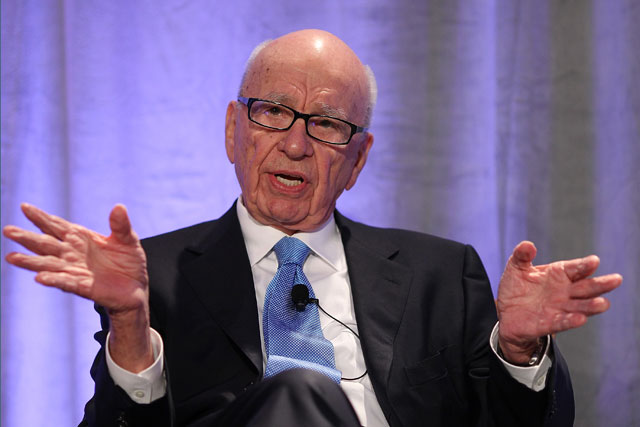
International Talk Like A Pirate Day will be held this year on 19 September. What a long way away that now seems (though we are already captaining the All About ship from one of the lifeboats, having tripped and fallen in, in anticipation of the maritime havoc that the day may bring).
But, of course, we're absolutely agog to discover whether Keith Rupert Murdoch, the slightly Australian, American media mogul, will be taking part in the event.
Because he's big on pirates, is our Rupert. We know this because we've been following him on Twitter, and Murdoch is an emphatic supporter of the Stop Online Piracy Act being scrutinised by the US House of Representatives. So exercised about this is he, in fact, that he has been moved to accuse President Obama (whose ambivalence on this matter has come to his attention) of allying himself with piracy and plain thievery (14 January).
Strong stuff. But then that's one of the most surprising things about his efforts. They're plain-speaking and somehow more personally revealing than you'd expect. He's not at all corporate - and clearly isn't availing himself of a Smithers-like sidekick. He Tweeted seven times on his debut day (31 December 2011) but, since then, his typical daily score has been five.
Hardline members of the Twitterati have been scathing of his technique. The hippest users these days are "meta" users. They only ever post links to existing online material, seek to add momentum to hashtag or trending themes, or retweet the opinions of others. They'd never do anything as gauche as to advance their own thoughts and opinions - which is what Murdoch tends to do. He's so 2007.
This is, though, you could argue, a rather disingenuous quibble - because most of Twitter's celebrity Tweeters do it this way and Twitter itself has been doing all it can in recent months (even going so far as to pay them) to encourage celebrity Tweeters. And you can tell Murdoch's a celebrity of sorts, because he often uses exclamation marks!
But, apart from that, what have we really learned? Well, if you've had the misfortune recently to stumble into one of The Guardian's more unpleasant online "comment is free" debates, you might have built up the impression that the great man is some sort of a neo-Nazi. And, true enough, he has Tweeted the word "achtung!" and confesses at one point that he has been messing about in U-boats.
But actually, he tends to reveal himself as the anti-establishment mischief-maker that he is at heart - for instance, when he declares his admiration for that truculent Scottish rabble-rouser Alex Salmond.
And yes, he confirms many things we already knew. He doesn't like President Obama, referring to him consistently using the contemptuous acronym POTUS; he is almost alone among the owners of content-creation businesses in having the cojones to take on Google; and he's a Republican.
But here's some of the stuff we didn't really know.
1. He likes art. His favourite website is art.sy, which showcases decorative and unchallenging middlebrow work.
2. He's interested in the euro. Yes, News Corp owns mainland European businesses and, like all economic liberals, he distrusts inherently undemocratic institutions. But still ... he clearly follows the granular detail, which few Americans (or Brits, for that matter) can be bothered to do.
3. He seems genuinely interested in social issues such as education.
4. He occasionally gambles. Gambling as a pastime, that is, not just a business philosophy. When he visits casinos, he has a penchant for 16 or 17 at blackjack.
5. He likes New York City when it's cold and empty. Just like his heart, the socialist community says. Just like Allen Ginsberg and the Beat poets, others say.
6. He knows how to say sorry (17 January). He also knows how to hold his hands up. Less than two weeks in, he acknowledged the ribbing he'd been getting from followers about his broader track record in social media: "Many questions and jokes about MySpace," he said on 13 January. "Simple answer - we screwed up in every way possible, learned lots of valuable expensive lessons." And you can't say any fairer than that.
7. As of last week, he had more than 150,000 followers. He follows 15.
WHAT IT MEANS FOR ...
- There are those who believe that Murdoch's conversion is utterly disastrous. Twitter, they argue, has been doing all it can recently to make itself as naff as possible - and this is just about the giddy limit.
- And, indeed, it's unfortunate when its users attract the wrong sort of publicity - as was more than adequately illustrated by last week's Gary Glitter kerfuffle. When a brand is commonly associated with paedophiles and octogenarians, then, at some point, it will come unstuck.
- Twitter's great strength is its ability to function as a broad church. At one end of the spectrum, there are people who are principally transmitters, celebrities or business people with something to promote; at the other end, there are passive users who use it as a news (or gossip) ticker.
- In the middle ground, there are myriad interlinked rings of genuine engagement and dialogue. Twitter's future prospects depend largely on the vitality of this middle ground - but it's from precisely this territory (some argue) that people will begin to defect if they believe the whole business has become chronically uncool.
- However, Chris Applegate (@qwghlm), a senior technologist at We Are Social London, can't see Murdoch's presence as in any way a setback for Twitter. Nor does he buy into conspiracy theories that, actually, Murdoch is performing a dastardly act of sabotage: "He is just one user - 150,000 followers is a lot, but Justin Bieber has more than ten times that and even he hasn't ruined the experience for the rest of us. The only way Murdoch could sabotage the platform would be if he bought it."

